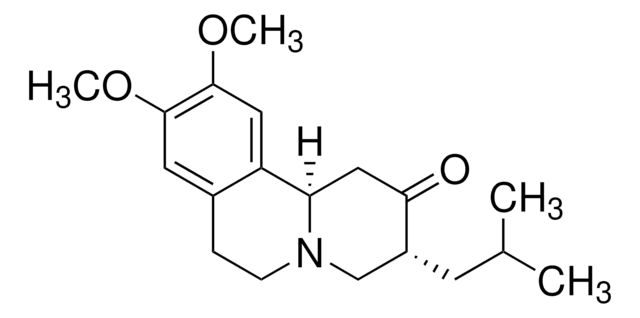Alle Fotos(1)
Wichtige Dokumente
T8694
TrkB/Fc Chimera human
>90% (SDS-PAGE), recombinant, expressed in NSO cells, lyophilized powder
Anmeldenzur Ansicht organisationsspezifischer und vertraglich vereinbarter Preise
Alle Fotos(1)
About This Item
Empfohlene Produkte
Biologische Quelle
human
Qualitätsniveau
Rekombinant
expressed in NSO cells
Assay
>90% (SDS-PAGE)
Form
lyophilized powder
Wirksamkeit
0.1-0.4 μg/mL ED50
Mol-Gew.
120-130 kDa by SDS-PAGE (reducing)
calculated mol wt 71 kDa
Verpackung
pkg of 100 μg
Lagerbedingungen
avoid repeated freeze/thaw cycles
Methode(n)
western blot: suitable
Verunreinigungen
endotoxin, tested
UniProt-Hinterlegungsnummer
Lagertemp.
−20°C
Angaben zum Gen
human ... NTRK2(4915)
Anwendung
TrkB/Fc Chimera human can be used in synaptoneurosome preparation and western blot analysis. Intracerebroventricular administeration of TrkB/Fc chimera human blocks TrkB ligand signaling and was used to study the role of BDNF in ATN response augmentation.
Biochem./physiol. Wirkung
Member of the Trk family tyrosine kinase receptors. Binds specifically to mediate neurotrophins BDNF and NT-4/5.
TrkB/Fc Chimera human consist of extracellular domain of human TrkB1 fused to histidine-tagged Fc region of human IgG1 by using a polypeptide linker. TrkB belongs to tyrosine kinase receptors family and facilitates the hippocampal development as well as regulating the synaptic plasticity that underlies long-term potentiation and learning. Brain derived neurotrophic factor (BDNF) and Neurotrophin 4 or 5 are preferred ligands for TrkB. Nevertheless it can also bind to NTF3/neurotrophin-3 that is less efficient in activating the receptor but regulates neuron survival through NTRK2.
Sonstige Hinweise
Extracellular domain of human TrkB fused to the C-terminal histidine-tagged Fc region of human IgG1.
Physikalische Form
Lyophilized from 0.2 μm filtered solution in phosphate buffered saline.
Rekonstituierung
Reconstitute to 100 μg/mL in phosphate buffered saline.
Hinweis zur Analyse
Inhibits BDNF-induced proliferation of TrkB transfected cells, BaF-TrkB-BD.
Lagerklassenschlüssel
11 - Combustible Solids
WGK
WGK 3
Flammpunkt (°F)
Not applicable
Flammpunkt (°C)
Not applicable
Hier finden Sie alle aktuellen Versionen:
Besitzen Sie dieses Produkt bereits?
In der Dokumentenbibliothek finden Sie die Dokumentation zu den Produkten, die Sie kürzlich erworben haben.
Yun-yue Ju et al.
Acta pharmacologica Sinica, 36(12), 1437-1443 (2015-11-17)
Brain-derived neurotrophic factor (BDNF) plays an important role in learning and memory in multiple brain areas. In the present study, we investigated the roles of BDNF in aversive memories associated with conditioned drug withdrawal in acute morphine-dependent rats. Conditioned place
Marian Tsanov et al.
Hippocampus, 21(1), 1-8 (2010-01-01)
The hippocampus projects to the anterior thalamic nuclei both directly and indirectly via the mammillary bodies, but little is known about the electrophysiological properties of these convergent pathways. Here we demonstrate, for the first time, the presence of long-term plasticity
Di Liu et al.
Neuropsychopharmacology : official publication of the American College of Neuropsychopharmacology, 45(9), 1557-1566 (2020-05-20)
Lithium has been used to treat major depressive disorder, yet the neural circuit mechanisms underlying this therapeutic effect remain unknown. Here, we demonstrated that the ventral tegmental area (VTA) dopamine (DA) neurons that project to the medial prefrontal cortex (mPFC)
Lulu Y Chen et al.
Proceedings of the National Academy of Sciences of the United States of America, 107(15), 7030-7035 (2010-04-02)
Learning-induced trophic activity is thought to be critical for maintaining health of the aging brain. We report here that learning, acting through an unexpected pathway, activates synaptic receptors for one of the brain's primary trophic factors. Unsupervised learning, but not
N Ninkina et al.
The Journal of biological chemistry, 272(20), 13019-13025 (1997-05-16)
We have isolated two novel variants involving the extracellular domain of TrkB from developing sensory neurons. These variants are generated by alternative splicing and lack two or all three of the leucine-rich motifs. Each of these variants is expressed as
Unser Team von Wissenschaftlern verfügt über Erfahrung in allen Forschungsbereichen einschließlich Life Science, Materialwissenschaften, chemischer Synthese, Chromatographie, Analytik und vielen mehr..
Setzen Sie sich mit dem technischen Dienst in Verbindung.





